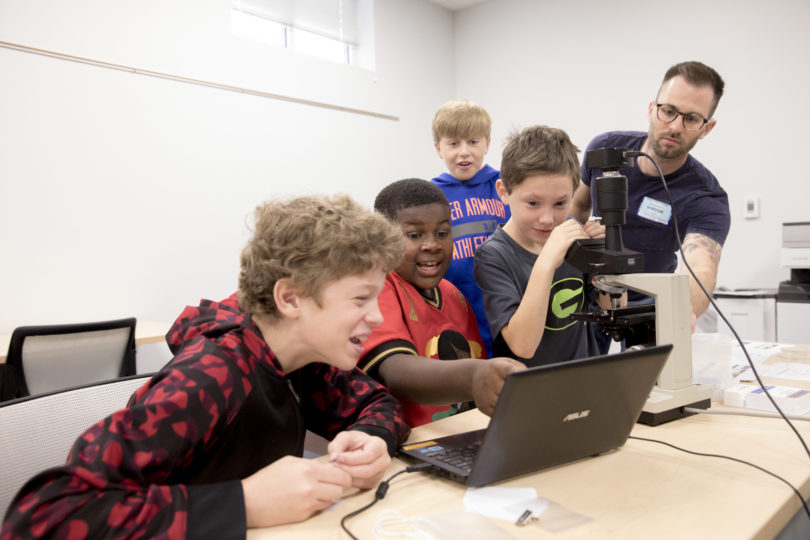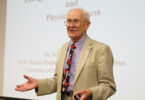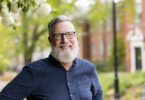It’s 8 o’clock on a Friday morning, but the room in Barrow Elementary School is full of energetic chatter.
Fifth-grader Nora Murthy, in particular, is really excited. She’s about to examine protists and other microorganisms under a high-power microscope. She and her classmates also will see the damage caused to red blood cells by parasites that cause diseases like malaria and African sleeping sickness, and they’ll swab their hands and the bottoms of their shoes, maybe even the inside of their noses, to grow bacteria they’ll examine in a few days time.
At the center of the excitement is Karl Lechtreck, an associate professor of cellular biology at UGA, accompanied by his team of three graduate students and a postdoctoral researcher. A self-described “Barrow Buddy,” Lechtreck started bringing his lab to the school when his children were students there and keeps coming back to help the students mark the end of their unit on cellular systems.
“I think that learning by doing is the best way to learn,” Lechtreck said. “The teachers try hard to provide a good education and do a really good job with that. It’s worth supporting, and UGA has so many possibilities to do just that.”
Located on the edge of campus in Five Points, Barrow frequently partners with the university to bring exciting learning opportunities to its students, said Jan Mullins, a teacher in the school’s gifted program.
“Our community and our school have deep schisms in our population, having both students whose families live in poverty and those who live in affluence, so it is crucial that we provide extra enrichment and sparks to learning for them all,” Mullins said. “UGA is a treasure trove for us and the community at large.”
As part of the Cell-a-Bration event, Lechtreck and his team set up four stations equipped with microscopes and iPads or computer screens that projected the image under the scope. The goal of these kinds of events is to engage students and catch their interest through hands-on learning opportunities.
Lechtreck isn’t the only UGA faculty to help out at the elementary school. Scott Dougan, associate professor of cellular biology, also has participated in past Cell-a-Bration events, and Nell Andrew, associate professor of art history, helped judge a Save the Frogs art contest at the school.
“When experts in the field, such as Dr. Lechtreck and his assistants, come in with passion, awesome technology (high-powered microscopes) and engaging activities, it’s only natural that students will gain a lasting learning experience,” said Shelley Olin, Barrow’s fifth grade science and social studies teacher. “And that’s the goal: For students to have fun in their learning and leave with a deeper understanding.”
And that was exactly what happened for Murthy.
“It was fun,” she said. “I like how you have a topic and then you can go deeper and deeper and deeper into it.”







